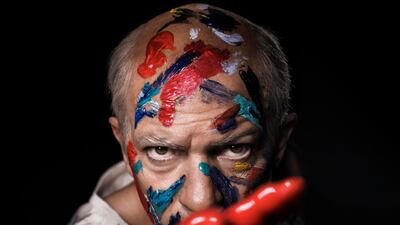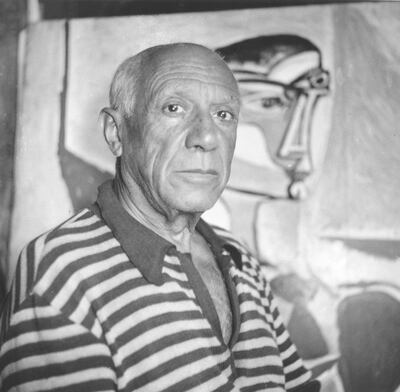Spanish actor Antonio Banderas, star of such franchises as Spy Kids and Shrek, has moved to the small screen for his latest project, National Geographic's biopic of his fellow malagueno, the artist Pablo Picasso. The 10-part series, Genius: Picasso, is a follow up to last year's successful Genius: Einstein, which gave the same treatment to the seminal German physicist. Intriguingly, Banderas faced a unique challenge in portraying his character that may not have faced Geoffrey Rush, who portrayed Einstein. Although Picasso lived until 1973, almost 20 years later than the scientist from the previous series, few reference points to the seminal Cubist survive on film.
“There is very little footage of Picasso talking,” Banderas explains. “You can see some documentaries where he is basically painting and moving in front of the camera, but not talking. I watched a couple of interviews, and I can see things that are happening there that I’m trying to incorporate into the character. There are a couple of moments that I can see his full body and how he walks. His walk is very characteristic. His feet are open. When I did a scene, and I did that kind of walking, immediately my whole body went into Picasso. I don’t know why. It’s very weird.”
Another element that Banderas says helped him get into character was an impressive make-up job from the production team. Banderas says that prosthetics were used to achieve Picasso's appearance in sittings that could take anything up to five hours before he could begin work on set, depending on the artist's age in the particular scene. The actor evidently found the experience an eye opener. "I have never used prosthetics in the way that I am using them now," he says. "And prosthetics are a mask that you have to learn how to use. If you put them on and you just go and don't look at yourself in the mirror to try to understand what is happening in your face and your expression, [if] you are making a mistake. I'm trying to understand me, this new me, with this new mask, and trying to move it, so it has that specific weight that I need for Picasso to have. It can be inconvenient, but I think that we're working with excellent professionals in order to achieve Picasso."
With few historical references for Banderas to use to assist with characterisation, the actor admits that the behind-the-scenes team were crucial to him nailing his role, with costume acting as the other vital ingredient.
“How I’m dressed is making me shorter, it’s making me wider, it’s making me more Picasso,” he says. “As soon as I get into those pants, shirts, everything, it’s not only just re-creating the time, but the person. It is actually making me Picasso. It’s reshaping my body. It’s very difficult to explain, but if I come here with my jeans and everything, I walk in a completely different way – I move in a completely different way.
“Then when I get in make-up and I put on my costume, I feel Picasso. These big, big parts of my Picasso are given to me by these magnificent professionals. It’s helping me a lot to find him.”
Banderas clearly has a huge respect for Picasso, and admits he was particularly proud to be able to offer the show as a gift to the pair’s home city of Malaga, where it was shot and where Picasso holds almost legendary status.
Like many great artists, however, Picasso had his flaws, not least an attitude towards women that may well have seen him banished to the fringes of the art world, in a manner that has befallen Kevin Spacey and Harvey Weinstein in Hollywood circles, were he working today. Banderas admits that portraying the more misogynistic side of the artist's nature was not something he greatly enjoyed. "The relationship with the women is interesting," he says. "Sometimes he's very harsh with them, and it actually moves me. I don't want to be like that. It's very painful."
At the same time, Banderas insists that Picasso did love the women around him, albeit in his own strange way. “When you study his life, you see that he never stops taking care of all of them. Almost like he kept them in a closet,” he says. “It’s ugly, but he couldn’t avoid it. He needed all of them. I think he was in love with all of them. But how can you do that? How can you live with all of this array of women? It’s not logical. It’s not, even for him, but he has this fight inside. I tried to show those moments of tribulations in the show. It’s extraordinary. You can judge it in many different ways, in terms of morality, but I still save him... I have to do it.
“I think he was absolutely sincere and he did exactly what he felt in the moment that he felt in love.”
From Banderas's words, it's clear that the actor had some personal struggles with the way he "saves" Picasso, a character whose morality he would deeply question in real life, but the star says he tried to keep his own views off set.
“I have my personal opinions, but I think it’s a mistake if I try to establish a morality on his character,” he says. “I don’t want to think about the morality of Pablo Picasso, why he did or didn’t do things because the circumstances were different than the ones that we are living today. The show is going to show that the characters were living in a completely different time. This is a man who was born in 19th-century Spain. The relationship between men and women was completely different from the one that we have today.”
One element of Picasso’s character that had no such grey areas, says Banderas, was his commitment to his art, even if it sometimes brought him into conflict with societal norms. “I think Picasso actually never stopped being an artist during the 24 hours of the day of the 91 years that he lived,” he says.
"He treated life as art – because he knew of the influence that real life had on his painting and everything that he did. He worked his whole life to never stop being a kid, to not become a mature person. He didn't have to. He allowed himself to create a life in a bubble in which he lived, and he didn't have to respect the rules of society, the society in which he was living."It's very interesting because as he's getting older, he's getting more and more modern. Picasso didn't have all of those barriers, the shields in front of him. Picasso was just absolutely sincere, at any moment. When he uses lies, it's just a game. It's just a game to obtain something – and it's kind of funny for him. He always behaved like a kid. And kids can sometimes be really cruel."
Genius: Picasso is broadcast every Monday at 11pm on National Geographic
__________________
Read more:
Modigliani sells for record $157m and Picasso tops estimates
$155m Picasso spending spree in 2 days for single firm
Artist forces French ministry to remove graffiti star's homage
__________________



